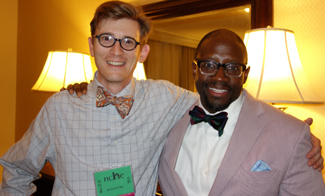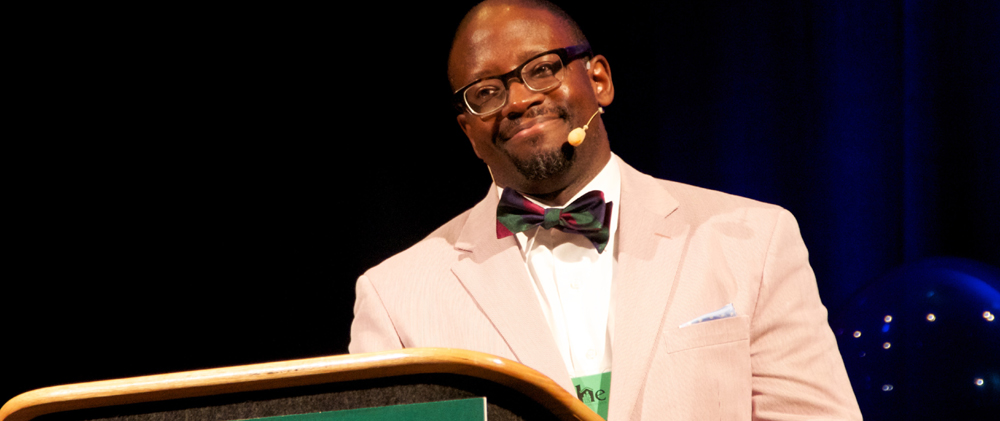In May NCHE held its thirtieth annual conference in Winston-Salem. As I write this, I am still recovering from the whirlwind of the experience. The conference has been the cornerstone of the service NCHE provides the residents of North Carolina. The conference is a large-scale production, and there are many moving parts, from dozens of vendors and speakers, to hotels and buses and meals—not to mention technological complexities, such as registrations and recordings. The conference committee reviews the process each year, as it seeks ways to make things run more smoothly. Ultimately, I believe the event was a huge success!
The conference has many goals, one of which is to make accessible to North Carolina residents speakers whose message resonates with the mission of NCHE and the spirit of parent-directed education. Some of these speakers are focused on educational methods; others are more focused on how the family understands and articulates its educational rights and responsibilities. The latter are more engaged in what I call public intellectualism—civil discourse about a wide range of social issues that inevitably employs moral and even theological concepts and categories.
This year NCHE was excited that Dr. Anthony Bradley of Kings College and the Acton Institute was one of our featured speakers. He delivered three  talks, including the Thursday keynote. In this article, I will briefly touch upon some of the ideas that Dr. Bradley discussed. However, I want to carefully note that we featured six speakers including: Rachael Carman, Sean McDowell, Dr. Jeff Myers, Diana Waring and Todd Wilson. All of these speakers were great and delivered messages which NCHE thinks are important. NCHE was excited to bring them to NC for the conference. The difference, however, between Dr. Bradley and the others is that Dr. Bradley has never spoken at a homeschooling conference. That fact alone is exciting for NCHE, as well as for him. It is exciting for NCHE because it means we are fulfilling our mission to serve NC families. One of the ways we can do that is to introduce North Carolina citizens to individuals who have unique perspectives and platforms and whose ideas about society and public policies enrich our own.
talks, including the Thursday keynote. In this article, I will briefly touch upon some of the ideas that Dr. Bradley discussed. However, I want to carefully note that we featured six speakers including: Rachael Carman, Sean McDowell, Dr. Jeff Myers, Diana Waring and Todd Wilson. All of these speakers were great and delivered messages which NCHE thinks are important. NCHE was excited to bring them to NC for the conference. The difference, however, between Dr. Bradley and the others is that Dr. Bradley has never spoken at a homeschooling conference. That fact alone is exciting for NCHE, as well as for him. It is exciting for NCHE because it means we are fulfilling our mission to serve NC families. One of the ways we can do that is to introduce North Carolina citizens to individuals who have unique perspectives and platforms and whose ideas about society and public policies enrich our own.
Dr. Bradley delivered a fantastic keynote Thursday in which he spoke about how our culture encourages children to be dissatisfied with the simple, productive and peaceful existence, that is God’s will for them. He asked us to think about I Thessalonians 4:11, “make it your ambition to lead a quiet life: You should mind your own business and work with your hands,” in contrast to our current culture. Sadly, our culture encourages everyone to seek self-aggrandizing fame and glory, to be “awesome” and to feel discontent when not being the center of attention. Dr. Bradley said that he was excited about homeschooling because of his own experiences in the college setting with students who had been homeschooled. He recognized their humility, their productivity and their heart of service. They seemed happy and ready to work at whatever was before them. These characteristics stand out, and Dr. Bradley thanked the room for their faithfulness to their children and their resistance to a culture that threatens to develop a generation of frustrated, dysfunctional adults.
Earlier in the day, I enjoyed Dr. Bradley’s talk about social theory. He spoke about two social concepts: subsidiarity and sphere sovereignty. These concepts emerged from Christendom during the turn of the nineteenth century and sought to challenge the prevailing view that emerged following the enlightenment and industrial revolution concerning the capacity for humans to order society by way of a strong state. While these two concepts are different, they are typically seen as complementary. Subsidiarity is Catholic in origin; sphere sovereignty was developed by Protestants in the Netherlands. I encourage you, homeschooler, to understand and employ these two concepts. Dr. Bradley’s talk provided a good introduction.
Of these two concepts, sphere sovereignty has had more influence on my thinking. Both concepts ultimately argue that the state is a legitimate social entity, created by God to help carry out God’s will, but one with a limited role amongst the many existing legitimate entities, such as the church, the family, the market, the academy. The challenge is crafting social policies that acknowledge the diverse rights and responsibilities of these many social entities and which honors the boundaries between the many social entities that exist.
It is important to note that these boundaries are not air-tight. That is to say that the social theorists who employ the concept of sphere sovereignty argue that each entity has a unique power, and that power should be exercised in a way that acknowledges the rights and responsibilities of the other entity and that assists it in its duty. In other words, the state is responsible for leading citizens in the pursuit of public justice, and the family is to assist the state in its attempt to carry out this right and responsibility. Likewise, the family is responsible for forming the character of the next generation, and the state is to assist the family as it seeks to carry out this right and responsibility. How do these two entities work together to help fulfill each other’s mission? How does this apply to families and education? These are difficult questions, but working to answer these kinds of questions is work that is good. I think it means that each of the social entities, the church, the market and, yes, even the state, have a legitimate role in education. However, when it comes to the education of children, all entities should be following the lead of parents.
The first talk Dr. Bradley delivered had to do with race. This is an important topic for our country, including the homeschool community. Sadly, my duties elsewhere caused me to miss this talk. Dr. Bradley has published works that I would encourage you to add to your reading list. In summary, I am happy that NC homeschooling families had a unique opportunity to hear Dr. Bradley and be introduced to his work. I am equally excited to hear that homeschooled children have had a positive impression on Dr. Bradley and others who are publically and actively talking about social theories.
For thirty years, NCHE has advocated for parent-directed education, and it is as important today as it has ever been to consider how the vision of parent-directed education helps society flourish and helps prevent society from falling victim to its own cultural fads. Ultimately, parent-directed education is a practice that empowers one of the smallest social units, a man and a woman and a small group of siblings, to radically impact culture. It is a great responsibility to rear the next generation. I’m thankful for the homeschooling leaders of the past who helped pave the way, as well as Christian social theorists, who argued and advocated for a more robust understanding of how the multiple social entities that God has ordained work together for the common good.



